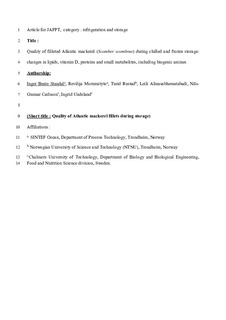Quality of filleted Atlantic mackerel (Scomber Scombrus) during chilled and frozen storage: changes in lipids, vitamin D, proteins, and small metabolites, including biogenic amines
Standal, Inger Beate; Mozuraityte, Revilija; Rustad, Turid; Alinasabhematabadi, Leili; Carlsson, Nils-Gunnar; Undeland, Ingrid
Journal article, Peer reviewed
Accepted version
Permanent lenke
http://hdl.handle.net/11250/2558437Utgivelsesdato
2018-02-16Metadata
Vis full innførselSamlinger
- Publikasjoner fra CRIStin - SINTEF Ocean [1387]
- SINTEF Ocean [1461]
Originalversjon
Journal of Aquatic Food Product Technology. 2018, 27 (3), 338-357. 10.1080/10498850.2018.1436107Sammendrag
Quality changes of vacuum-packed Atlantic mackerel (Scomber scombrus) fillets during 12 months’ frozen storage at −27°C and 9 days’ chilled storage at +4°C were evaluated. Freezing at −27°C preserved the long chain n-3 polyunsaturated fatty acids (LC n-3 PUFAs), both in light and dark muscle, vitamin D, and the low molecular weight metabolites (LMW) (studied by high resolution nuclear magnetic resonance spectroscopy, HR NMR). Protein oxidation took place, especially between 1 and 7 months, decreasing water holding capacity and protein extractability. During chilled storage, no lipid or protein oxidation was observed, but lipolysis increased, and several LMW metabolites relevant for sensory and nutritional quality degraded into non-favorable compounds. The content of biogenic amines was high at day 9 (e.g., 18 mg histamine/100 g), jeopardizing safety. Preservation of mackerel fillets by freezing at −27°C is thus a better option compared to prolonged chilled storage at +4°C; the quality was well preserved for 12 months’ frozen storage.

